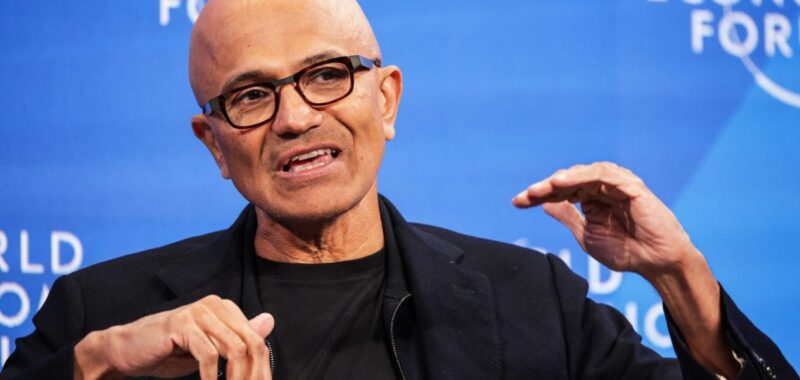
Microsoft won’t impose a new return-to-office mandate unless management concludes that productivity has dropped, a high-level exec has reportedly told workers.
The software and cloud-computing giant currently allows employees to work remotely, with many new hires promised the flexibility of working from home at least half the week. But that isn’t written in stone.
According to two anonymous sources that spoke with Business Insider, executive vice president Scott Guthrie recently told staff at his Microsoft’s Cloud and AI group, which includes Azure, that a policy change isn’t on the cards at present—so long as workers stay productive.
Fortune has reached out to Microsoft requesting comment on what specific metric for productivity is used, how that would be benchmarked, and whether the process would be made transparent for employees.
While no statement has been provided as of press time, Microsoft told Business Insider that the company’s work policies have not changed.
Amazon CEO Andy Jassy’s bombshell decree has roiled tech employees across the sector, many of whom dread a return to hours wasted in traffic jams on the long daily commute.
That’s assuming a suitable branch office is even within driving distance for those who joined with the understanding they would work remotely on a permanent basis.
As a result a number of staff are now “rage applying” for a new job, with some experts predicting Jassy and other execs like him will eventually be forced to backpedal amid widespread worker revolts.
White-collar and blue-collar tensions
Experts have suggested RTO mandates may in fact be an excuse to elegantly trim staff numbers without restorting to severance by simply motivating employees to quit. According to a recent survey by anonymous job review site Blind, some 73% of verified Amazon professionals said they’re considering quitting.
The RTO issue is contentious, and Jassy is by no means the most draconian CEO when it comes to the issue.
Elon Musk may very well be the most outspoken executive opposed to remote and hybrid work, having already ended the practice in June 2022 at Tesla. He suggested white-collar employees who want the continued flexibility remote and hybrid work offers were in fact simply lazy. “They should pretend to work somewhere else,” he said in defense of his approach.
The entrepreneur, however, is only demanding the same attendance for his knowledge workers as his shop-floor workers, whom he required to show up in the middle of the pandemic’s first wave. He branded what he called the “laptop class” as out-of-touch elites that give off “real Marie Antoinette vibes” compared with the work ethic of their blue-collar brethren manning assembly lines.
Musk may have had a point when it came to growing resentment over differing treatments within the workforce.
U.S. dockworkers along the Eastern Seaboard and on the Gulf Coast are now going on strike for the first time since 1977, in a move that could cost the U.S. economy up to $4.5 billion every day. Striking port employees are demanding fair compensation from port operators for their efforts over the past six years including the pandemic.
“When [ports] made their most money was during COVID, when my men had to go to work on those piers every single day when everybody stayed home to go to work. Not my men; they died out there with the virus,” said president Harold Daggett of the ILA trade union. “Nobody stayed home. Well, I want to be compensated for that.”
Data Sheet: Stay on top of the business of tech with thoughtful analysis on the industry’s biggest names.
Sign up here.

